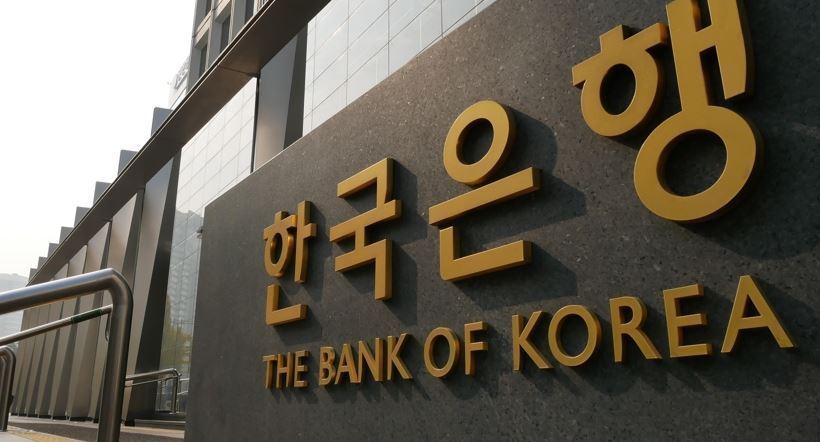The Bank of Korea Friday kept its policy rate frozen for the remainder of the year to see the impact of recent rate cuts on Asia's fourth-largest economy.
But the central bank again trimmed its growth outlook for this year and next year amid still prevailing headwinds.
BOK Gov. Lee Ju-yeol said the local economy is estimated to grow 2 percent on-year in 2019 and 2.3 percent next year.
The figures mark downward revisions from the 2.2 percent for 2019 and 2.5 percent for 2020 forecast in July.
"The Monetary Policy Board decided to keep the base rate steady, though the growth outlook has been revised down in that (the board) slashed the base rate in October in anticipation of the downward revision in the growth outlook and that there is a need to first see how the macroeconomy will move in the future," Lee told a press conference.

In October, the BOK board cut the policy rate to a record low of 1.25 percent in its second rate reduction in three months.
"Looking ahead, the board will conduct monetary policy so as to ensure that the recovery of economic growth continues and consumer price inflation can be stabilized at the target level over a medium-term horizon, while paying attention to financial stability," the board said in a released statement.
"In this process it will judge whether to adjust the degree of monetary policy accommodation, while carefully monitoring developments in the US-China trade negotiations," it added.
The decision to keep the base rate frozen was in line with market consensus.
In a recent survey conducted by Yonhap Infomax, the financial news arm of Yonhap News Agency, all 18 experts polled anticipated a rate freeze in the central bank's eighth and final rate-setting meeting of the year.
The decision, however, follows a long, and evidently well-predicted, reduction in the growth outlook, which often warrants additional steps, including monetary policy measures, to boost the economy.
Lee said the local economy may have hit the bottom and that it will likely begin rebounding next year.
"It is not easy to say but I believe the local economy may be touching the bottom. There may be some ups and downs in the future, but the major stream will not deviate too much from the current course before starting to gradually improve in the middle of next year on eased global uncertainties and recovery in the IT sector," he said.
South Korea's exports had dropped for 11 consecutive months as of October amid the prolonged Sino-American trade tussle.
Its consumer prices have also been growing at record low levels, dipping to an all-time low of negative 0.4 percent growth in September.
Lee said the country's consumer prices were expected to rise 0.4 percent from a year earlier in 2019 before rising to around 1 percent in 2020.
"It is true that uncertainties stemming from the US-China trade dispute have been somewhat eased with a possible initial deal between the two countries," he said.
The BOK chief noted a complete resolution of the US-China trade dispute may lead to a quicker recovery of South Korea's economy.
"We may expect a rise in investment, as well as an expansion in global trade, which in turn will eventually contribute to an increase in our exports," Lee said.
He also reaffirmed the BOK still has room for monetary policy maneuvers, despite the base rate currently sitting at a record low that was once seen in 2016.
"Our base rate is currently at a level that leaves space for (additional) monetary policy measures," he told the press conference.
The top central banker said one of the seven BOK board members voted for an additional rate reduction Friday. (Yonhap)


![[AtoZ into Korean mind] Humor in Korea: Navigating the line between what's funny and not](http://res.heraldm.com/phpwas/restmb_idxmake.php?idx=644&simg=/content/image/2024/04/22/20240422050642_0.jpg&u=)

![[Exclusive] Korean military set to ban iPhones over 'security' concerns](http://res.heraldm.com/phpwas/restmb_idxmake.php?idx=644&simg=/content/image/2024/04/23/20240423050599_0.jpg&u=20240423183955)

![[Herald Interview] Why Toss invited hackers to penetrate its system](http://res.heraldm.com/phpwas/restmb_idxmake.php?idx=644&simg=/content/image/2024/04/22/20240422050569_0.jpg&u=20240422150649)
![[Graphic News] 77% of young Koreans still financially dependent](http://res.heraldm.com/phpwas/restmb_idxmake.php?idx=644&simg=/content/image/2024/04/22/20240422050762_0.gif&u=)







![[Exclusive] Korean military to ban iPhones over security issues](http://res.heraldm.com/phpwas/restmb_idxmake.php?idx=652&simg=/content/image/2024/04/23/20240423050599_0.jpg&u=20240423183955)



![[Today’s K-pop] Ateez confirms US tour details](http://res.heraldm.com/phpwas/restmb_idxmake.php?idx=642&simg=/content/image/2024/04/23/20240423050700_0.jpg&u=)